#publishing stuff
Explore tagged Tumblr posts
Note
If your book earns out (eventually)that's good for the author and publisher, right? Why is there a big stress on preorders, first week sales and what a book does right out of the gate? Shouldn't publishers wait a year before they make a final determination to a books success? Especially with things like TikTok that can help bolster sales out of nowhere. It seems like there's so much pressure on authors for success straight away. Do publishers just want their investment back ASAP?
I don't know how you got your question to be in bold? ANYway, since there are like 30 questions in here I'm just going to take them bird by bird.
If your book earns out (eventually) that's good for the author and publisher, right? Yes, of course.
Why is there a big stress on preorders, first week sales and what a book does right out of the gate? Well, for several reasons:
-- A book with a ton of pre-orders feels "exciting" -- if you owned a bookstore, and you had ordered two copies of GREATBOOK initially to come in -- but then 30 people pre-ordered it from you -- you'd probably strongly consider ordering EXTRA copies, right? That seems like an indication that people really are interested in this book, you should have a pile of them, not just two! You should put it on display!
-- A book with a ton of pre-orders and first-week sales has a much better chance to hit a bestseller list (specifically, the NYT bestseller list). Why? Let's say your author started asking people to pre-order six months ago and those orders have been stacking up in dribs and drabs. But that book doesn't go on sale until January 15th. ALL SIX MONTHS of pre-orders are going to get rung up on release day. The NYT is based on books sold during one week's time compared to all other books sold during that one week. Obviously, a book with a ton of pre-orders will get a big boost that week!
-- Books that hit the list get more visibility, they get people hooting about them on social media, they get to be called "NYT Bestselling" which seems fancy, ALL of that can very much help sales going forward. Is it the be-all-end-all? No, of course not. But there's no doubt that it's NICE!
-- The majority of publisher-led publicity and marketing efforts are focused on before or soon after release date -- getting gatekeepers like booksellers, librarians, etc whatever interested in ordering the book into their stores and libraries, getting reviews, pitching the book to media outlets, etc -- so IF those efforts are going to help a book, you're more likely to get that boost when the book is new. After several months have gone by, a thousand newer books have come out, focus has shifted to those books.
Shouldn't publishers wait a year before they make a final determination to a books success?
I mean - I think they do? These things are not mutually exclusive. Of course they'd like to have a lot of success right out of the gate. Obviously, they'd be delighted to have a lot of success later, as well. Plenty of books grow in sales as time goes on, etc -- I don't think anyone is deeming a book a failure if the book doesn't hit it out of the park immediately. I can't speak for adult books, but on the kid's side, we don't really know what kind of longevity a book might have for probably at least a year, because there needs to be time for books to make their way onto state lists, into curriculum, and stuff like that -- for teachers to read it to classrooms, for kids to get hooked and tell friends, etc etc. Once a book is out in paperback and really getting imbedded into schools, we might see BONKERS sales that could never have been predicted from a sluggish start in bookstores a year or two earlier. Publishers are well aware of this -- books are not going out of print in the first year after release.
Especially with things like TikTok that can help bolster sales out of nowhere. It seems like there's so much pressure on authors for success straight away.
Yep, there are plenty of examples of books that have surprising late-in-life success bc of TikTok (or whatever) -- HOWEVER, the difference is, the publisher and author have little to no control over a book suddenly going viral "outta nowhere"! IT'S AMAZING AND GREAT when that happens, we can all wish for it and hope for it -- but it feels kind of out of our hands -- whereas things like pre-orders, getting blurbs, yadda yadda, are at least things that the publisher and author have a MODICUM of control over. They can't MAKE people pre-order, but they can TRY at least!
Do publishers just want their investment back ASAP?
That would be great, sure. But profit margins are slim, and many books never earn out. Publishers know that they are probably going to just break even on a lot of books, and lose money on some, and have big hits with a few. I don't think anyone is expecting every book to have massive pre-orders or huge initial sales or whatever else.
Further: Most of this "pressure" is coming from the authors themselves. Like, the call is coming from inside the house. I've NEVER heard a publisher insist that an author do some enormous pre-order campaign or hit social media relentlessly for months -- actually it's more likely that a publisher in the year of our lord 2024 will say that they don't really think a massive pre-order campaign is worth the effort. I've NEVER heard a publisher say that anything in particular rides on first week sales, or insist that a book must hit a bestseller list. Of course they are hoping for it, it would be great! But it would be foolish for them to say that it WILL or MUST happen, and if it doesn't, it doesn't diminish the author or their efforts in any way. Obviously when award-time comes, publishers AND authors are likely crossing their fingers that a book will get a big shiny medal, and they might be a little disappointed if their book doesn't get one (especially if armchair experts online were predicting that it might) -- but I've NEVER heard a publisher put pressure on an author about that kind of thing, either, if anything, the opposite.
Publishers are, in fact, much more likely to be trying to temper outsize author expectations, rather than stoking them. There might be a few outliers -- huge-name authors where everyone really does expect instant NYT success and glory, so if it doesn't happen for some reason, there's some disappointment all around - but truly? That level of expectation is quite rare, and if you happen to be in that echelon, you probably aren't asking questions like this on Tumblr, you're busy swanning around the Isle of Capri or something. And actually you probably don't feel PRESSURE to hit the list in that case anyway -- you just expect you will as that is normal for you. Bless.
Regular authors? Which is 99% of the authors reading this post? You can go ahead and calm down. We love you regardless of your pre-orders or initial sales. If you feel "enormous pressure" for "instant success" -- really take a look at where that pressure is coming from. Because it's probably not from agents or publishers, who know from long experience that almost no success is "instant" by any stretch of the imagination.
173 notes
·
View notes
Text
i understand the urge to tweak and tweak until something is perfect but some authors need to understand when we say last call for changes was a month ago, we fucking mean it. we cannot keep saying “okay i’ll squeeze in one last fix for you” forever bc well now we are at the fucking printer my guy
10 notes
·
View notes
Text

if it's good enough for you, then it deserves to be made. don't let anyone else decide if your story is worth it or not.
#this more for myself than anything#because i get so bogged down on if my story is good enough for other people and if others would like it#writeblr#creative writing#writers of tumblr#writerscommunity#writers#writer stuff#book tropes#novel writing#writing#writers on tumblr#bookblr#authors#book writing#writer#publishing#writing stuff#on writing#ao3 writer#female writers#writers and poets#writing life#writing memes
59K notes
·
View notes
Text
Steps to Write a Genuine Platonic Relationship

follow for more tips 💋 || request writing tips 💌
1. Establish the Foundation
Define Their Connection: Decide what brings these characters together—shared history, common interests, or a deep emotional understanding.
Set Boundaries: Clarify from the start that their relationship is non-romantic, avoiding any lingering tension that could be misread as attraction.
Give Them Complementary Strengths: Show how they support and challenge each other without romantic implications, emphasizing mutual respect.
2. Shape Their Role in the Story
Decide Their Impact: Determine how their bond influences the plot—do they solve problems together, serve as each other’s moral compass, or push each other toward growth?
Avoid Romantic Clichés: Refrain from using traditional romantic tropes like longing glances, accidental physical tension, or excessive jealousy.
Show Their Value Beyond Love: Let their relationship be crucial to the story in a way that isn’t reliant on romance or tension.
3. Build Their Dynamic
Use Natural Banter: Let them have inside jokes, tease each other, or share moments of camaraderie without any romantic undertones.
Create Moments of Deep Understanding: Show how they confide in one another in ways they wouldn’t with others, reinforcing their trust and emotional closeness.
Let Them Have Other Romantic Interests: This solidifies that their bond isn’t about unspoken attraction, making it clear that romance isn’t lurking in the background.
4. Define Their Chemistry
Make Their Interactions Unique: Ensure they have a specific energy that distinguishes their bond from romantic connections in the story.
Emphasize Loyalty Over Possessiveness: They can care deeply about each other without feelings of possessiveness or unresolved tension.
Show Physical Comfort Without Romance: Casual, platonic touch like a ruffling of hair, a side hug, or a reassuring pat on the back can reinforce their connection without romantic connotations.
5. Demonstrate Their Impact on Each Other
Let Them Grow Together: Show how they influence each other’s decisions, ambitions, or emotional development without needing romance as a motivator.
Create High-Stakes Moments: Put them in situations where they rely on each other, proving their bond is just as deep as any romantic relationship.
Allow Conflicts Without Romantic Resolution: If they fight, let their reconciliation stem from their friendship and values rather than an underlying romantic interest.
6. Develop a Satisfying Arc
Decide Their Long-Term Dynamic: Whether they remain lifelong friends, drift apart naturally, or take different paths, ensure their bond leaves a lasting impact.
Showcase Their Relationship’s Meaning: Highlight how their connection was vital to their growth, reinforcing the importance of strong, platonic love.
Avoid Unnecessary Romantic Subtext: Let them stand as proof that deep, meaningful relationships don’t need romance to be powerful.
Examples of Strong Platonic Relationships
1. Film/TV Examples
Frodo & Sam (The Lord of the Rings): A loyal, emotional bond built on trust and shared hardship.
Robin & Steve (Stranger Things): A brother-sister-like friendship that develops beyond a possible hetero-romance.
Steve Rogers & Bucky Barnes (Captain America): Sibling-like love based on support, teasing, and mutual admiration.
2. Literature Examples
Duke the Guarder & Dawn Demiss (The Guardians of Camoria series): A deep friendship based on emotional intellect, trust, and shared insecurities.
Jo March & Laurie (Little Women, after rejection): A lifelong friendship that remains strong despite romantic expectations.
Harry Potter & Hermione Granger (Harry Potter series): A close friendship built on trust, emotional support, and respect without romantic tension.

Follow || Like || Comment || Repost || My Novel ⇚⇚⇚
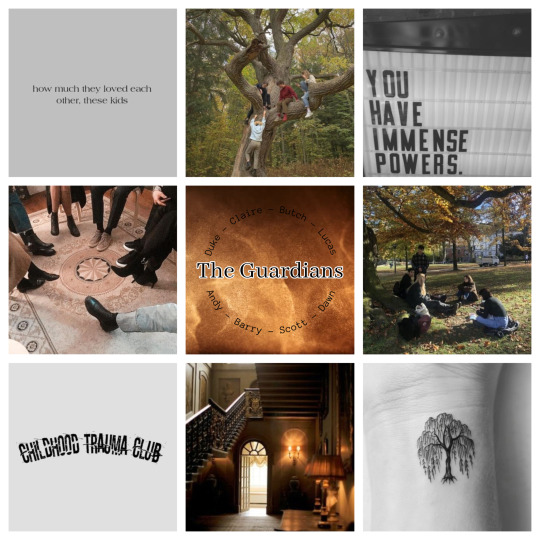

thank you, i am farkle :)
thank you @celestialgarden23 for the request :)
#౨ৎ a.a.walker's tips ౨ৎ#writer#writers on tumblr#creative writing#booklr#academia#aspiring author#nostalgia#on writing#artists on tumblr#college#on writers#writing tips and tricks#writing help#writing advice#writing resources#writing stuff#fiction writing#writing tips#storytelling#narrative#publishing#fiction#write#writeblr#writers and poets#writerscommunity#writerscorner#writersconnection#writers
3K notes
·
View notes
Text
Success is Dependent on Secret Information
A lot of career success depends on you and the work you put into it, as well as luck beyond your control, but sadly, it also depends on secret information, magic words, and stupid little tricks.
That's not fair. I don't like it, but we can help by sharing that secret information--which is the antidote to gate-keeping. That's why I recently wrote this in my Authors of Nonfiction Books in Progress substack:
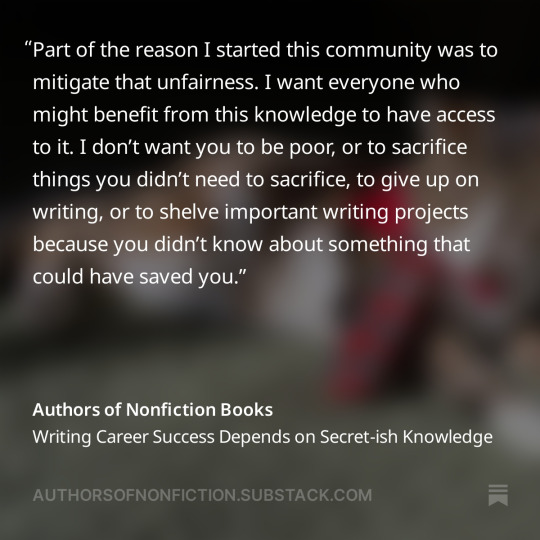
It can be really disheartening to realize that, when you thought you failed at something because you didn't do well enough, other people had the magic words. For instance, some injustices I've witnessed (that may or may not always be the case, or maybe not anymore!) include:
A good athletic score doesn't get you into a college sport--having a coach or parent talk to the college coach is mandatory
Many school-sponsored scholarships are often not tightly linked to grades, test scores, or financial need, but whether the student said the right words ("I can't afford that") to the right person (presumably some financial office person.)
Apparently, some aspects of some degrees are cheated on by most students (if that's the case, we should tell all students that it's ok to cheat on that so they don't waste their time on something that apparently wasn't important anyway, or worse, fail out just for being ethical.)
Especially related to books: Few people will mention that you can get grants! Not my agent, not my publisher, not the 1 zillion "pros and cons of trad publishing" articles out there mentioned grants (Grant eligibility is a HUGE benefit of trad publishing.) I got more money from grants than my entire book advance!
Let me know what magic words/secret knowledge you've learned, that you wish you knew sooner. Or: the widespread understanding of what information would make a field more fair?
And please share ANBIP with anyone writing, publishing, or seriously about to start writing, a nonfiction non-memoir book, especially if they're interested in the more practical side (I share more about resources and strategy than craft.)
#book writing#I want to share this stuff with everyone!#Funny thing: I stopped sharing this info on FB because those groups get really mad any time I mention trad publishing#Literally no matter how I phrase it#Another reason I started this group was to gather resources for people who share similar ideologies about book-publishing#no hate to anyone who thinks differently
2K notes
·
View notes
Text
If Lois Lane had a nickle for every time she had to help an overpowered boy from the midwest with the power of journalism, she'd have two nickles. Which isn't a lot but its weird that its happened twice.
Danny watched as Lois pulled out her phone and pulled up a recording app.
“What are you doing?”
“You came to a journalist and are surprised to get an interview?” She asked him, her tone clearly joking. “What you’ve given me here is great kid, but newspaper clippings and copies of federal laws don’t get the public’s attention. I need a story, Phantom’s the story.”
“I’m not Phantom.”
Lois looked at him, less than impressed. Slowly, she turned the screen of her computer until it was visible to both of them. There, in full clarity, was a front-page story from his hometown newspaper. ‘Danny Phantom saves Bus Full of Children!’ and there was a picture of him in his ghost form, his face crystal clear on her screen.
"Phantom’s a ghost. I’m just a dumb kid.” Danny tried again.
Lois pinched the bridge of her nose with her right hand and muttered to herself.
“Why do all you midwestern boys have the same schtick?”
“I’m sorry?” Danny said, unsure if he should be apologizing or not.
“Changing your last name from Fenton to Phantom does not a secret identity make kid. It might work for most civilians, but anyone familiar with the hero game will clock you from a mile away.”
“I’m not Phantom.”
“Sure, kid. But I’m sure you have a way for me to interview him, right? Because I want to talk to him before I do anything else about your town.”
Danny hugged himself and looked down at his knees.
“Is it really that bad?”
“Not the worst I’ve seen. Wonder Woman’s is paper thin. I'm pretty sure most people in DC know who she is outside of the cape and just don’t say anything because she scares them.”
Danny snorted involuntarily at that, looking back up at the woman.
“What’s going on in your town, Phantom? Why come to a journalist and not the Justice League?”
“The Anti-Ecto Acts got passed like a year ago. They state that only being that produces or contains ectoplasm above a certain amount is considered non-sapient and is to be turned over to the government for disposal.” Danny said. “I put the whole thing in there for you to read, but it's long. Amity Park has a lot of ectoplasm in it. It's seeped into the air and water. Normal human people have it in them now. At first, those agents were just firing at me whenever I finished a ghost fight. I could deal with that. Their aim is terrible anyway. But then they figured out that humans can become contaminated with ectoplasm. They decided that meant the entire town was under their jurisdiction. They've decided that means that no one in town counts as human anymore, that we don’t have rights, that they’re doing us a favor by not just exterminating the entire town like the law says.”
Danny leaned forward, putting his hands on the desk in front of Lois Lane. He looked right into her bright eyes and spoke seriously.
“When it was just ghosts under attack, I didn’t think anyone would care. I’ve tried calling the Justice League for help, but they’ve brushed me off. People need to know what’s happening. Anyone can become ecto-contaminated. You just have to be in the right place at the wrong time. It’s not right what’s happening to Amity, Miss Lane. I came to you because if anyone could get the world to listen, to believe, then it's got to be you.”
And Lois Lane smiled. It was a proud, eager smile. The kind of smile Danny had seen on Sam right after she convinced the school to serve a vegan lunch. He barely held back from shivering.
“Well then, Mr. Phantom.” Lois said, before tapping onto the recording app on her phone and starting a recording. “Let’s begin.”
#lois lane#danny phantom#danny has snuck out of amity park#lois senses both a story juicy enough to win a pulitzer and a new intern/protege on her hands#does she tell clark whats going on?#nope her loser superhero boyfriend can find out with everyone else when perry publishes her story on the front page with everyone else#dpxdc#dp crossover#dc x dp#dp x dc#dp x dc crossover#to be clear ive written like 12k for this fic idea. hopefully i can get around to actually posting stuff to ao3 again.
2K notes
·
View notes
Text
List of things that sparked joy in my little Ancient culture enthusiast heart:
The moths in the Ancient Urban are essentially pigeons, including the fact some of them are tagged.


Finally a proper and canon confirmation that Ancients really did have pets, positive relationships with animals and weren't Only stuck in glass cubes on display like Moon implies once. It can also mean that they did research into animal behaviour, such as tracking migrating and such. From how biologists are in real life, we can assume they were even genuinely passionate & happy about these type of things.
All the pottery and plates in that workshop room,


A confirmation that they did have paper and used scrolls for writing stuff down,


alongside with the pearls that they, too, could perhaps freely read or one of those things on the shelf there might be a pearl reader, if it is more technologically based (CDs type information keeping)

I also wonder if those things there are books- with stone tablet pages or paper ones? digital things hidden in hardcovers?- or something else entirely. Do they maybe hold orders for earthenware?
The masks on the wall, they feel so real compared to the murals.

Are they of the same person or is it of the workers there or maybe a family? Some of them look similar to those in the murals.
While at the concept of family, they had creches, but it doesn't sound like it was an outright job in the sense that they seem to have been community-raised (I fuckin' knew it I can put down my tin hat now).

They had hard beds, similar to what used to be used in old china iirc, along with that pillow/headrest

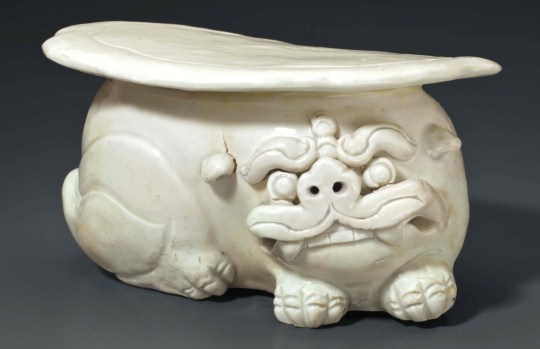
This kinda thing. They were made out of porcelain to keep the head cool in the night, but I think some where out of wood too.
The bustling of the city.
The normalcy of people going about their day, talking, the vehicles zipping by (they had some kind of motor vehicles!!!!).
The architecture, in both the Ancient Urban and the Outer Rim (those roofs made the right side worth it to me, that's how much I love these bastards)
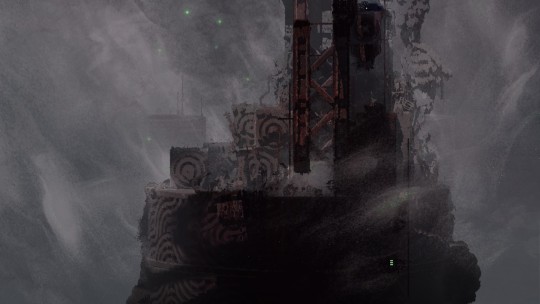
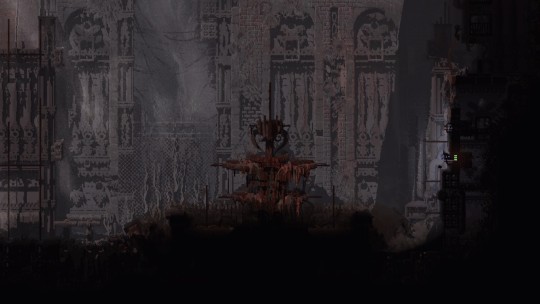
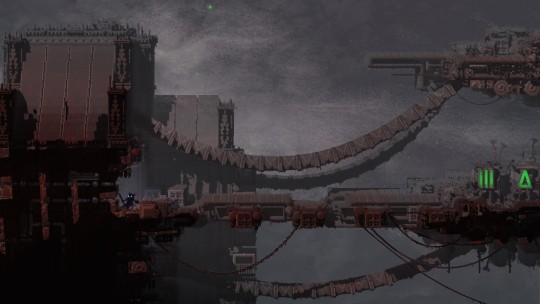
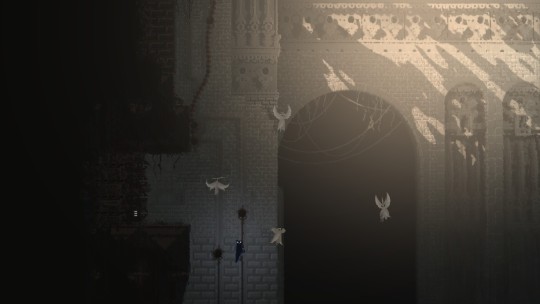
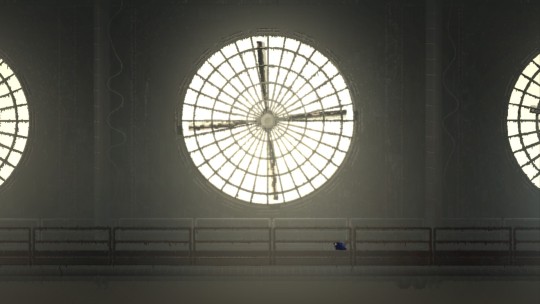
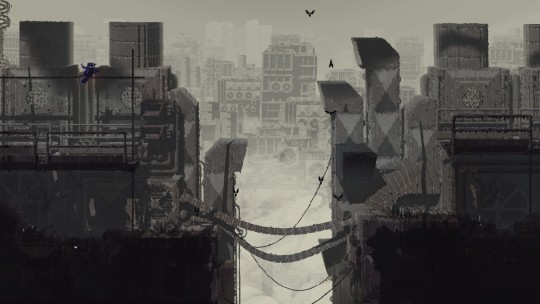
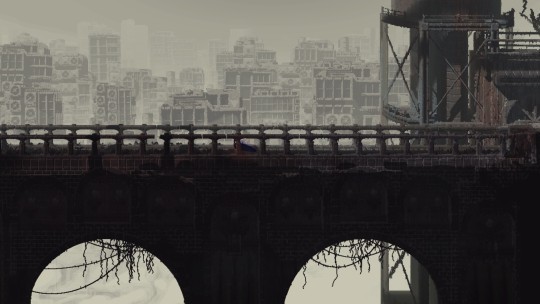
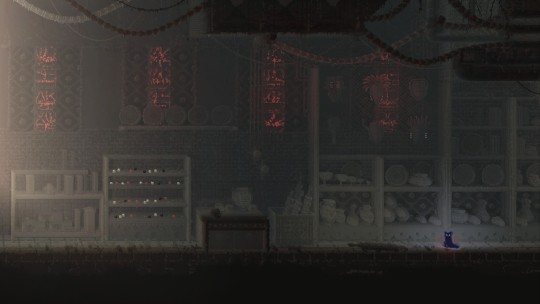
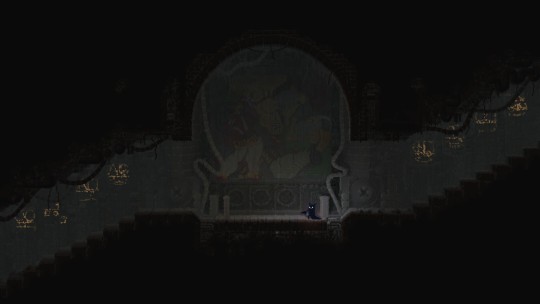

I find it very funny that what looks to me like a REALLY poor ass cable management seems like the height of decorative prowess to them. Also some insight into how the void ,,bath" actually looked like.
The toys... just the toys.

Alongside these dialogues


And the one about him remembering the halls he ran through- oh when I say that I adore the fact that this Echo is a kid stuck here, lonely and vulnerable with polite speech not plaguing it.
The original Echoes combined with the Iterators' distaste for the species as whole painted the Ancients as these heartless things lazer focused only on the Ascension, religion and rituals. There wasn't much space for thinking about them in a more human manner and I feel like most of the fandom did depict the Ancients only as the impression was given. Bunch of posh full of themselves suckups, uncaring much for one another or anything around them.
I get kinda annoyed when there's an insistance that some kind of sapient species has done only bad. With humans, too, I just about had it with the demonization, negativity and staggering blindness to the beauty and good we can and do create- in both fiction and reality. Same goes for these dumbasses.
Disko kid here begs to challenge that impression. He's lost and alone and kind of scared, stuck here not knowing how to move forward. He mourns the regularity and simplicity of his room, the nostalgia of shelves and toys, the golden sunrays sneaking in through the windows. He brings a certain humanity into the consideration of Ancients.
That maybe, only maybe.. they deserve to be mourned.
#spot says stuff#rain world#rw#rw watcher spoilers#rw ancients#and ofc that window look that one made me actually stop breathing for a second. they were MOVING right in FRONT OF ME-#it was essentially seeing a dead man casually walk up.#i swear if videocult published a 500 page book on the Most basic regular shit in the Ancient culture I'd end up memorizing it.
917 notes
·
View notes
Text
feels likes theres a new shonen anime taking the world by storm every few months and every time theres some guy shitting themself because it's supposedly breaking all the boundaries of shonen (the protagonist is not like goku) only for the ending to be the equivalent of a wet fart and noone ever thinks about it again
#not to say that any of them are like actually bad#i just think people need to read stuff not published by shonen jump
690 notes
·
View notes
Note
Hi Jenn,
Do people in the industry still use the term “traditional publishing”? I was told that was an incorrect term and that it should be referred to as “trade publishing.”
Do you know why some people consider the term offensive?
Thanks!
OK so here's the thing:
Publishing is a vast industry and within it there are several different "markets" - that is, places that a given book might be created for and sold.
The actual correct term for the branch of the publishing industry I work in, and most authors and illustrators I know work in, and most publishers we work with, is Trade Publishing.
Trade Publishers -- like most imprints of Penguin Random House and Macmillan and Chronicle Books and Candlewick, etc, basically all the publishers you normally hear about -- mostly publish "into the Trade Market." The "Trade Market" is regular bookstores. Pretty much 99% of the books you see on the shelves in B&N or whatever are Trade Books.
There are other markets! For example(s), Educational Publishing is its own market, with its own publishers and its own norms. Religious Publishing is its own market, with its own publishers and its own norms. There are obviously Trade Publishers who also publish "religious" or "educational" type books -- but they are still TRADE BOOKS, they are the religious and educational books you'd see at the regular bookstore. Truly Religious Publishers or Educational Publishers are peddling their books primarily through their own separate distribution channels, and they don't normally work with agents in the same way as Trade Publishers do. If you only shop in a regular bricks-and-mortar bookstore, you may never even see actual Religious Market specific or Ed Market specific books, they would be more likely found in a Religious Bookstore or through a Library or some such. (Though of course, all of them are available online!)
(There are other Markets, too -- like "Mass Market" refers to both a kind of book -- those short chunky paperbacks like they sell in the supermarket or drug store -- and also a Market, specifically, "places like the supermarket or drugstore". Some/most of these books originate in the Trade Market - some are made specifically for the Mass Market).
"Traditional" publishing is a term that sprung up in relatively recent years (like, the past 20 years or so???) -- to differentiate it from Self-Publishing/"Indie Publishing" -- so often on websites where, for example, people are advocating for self-publishing options, they will say "We are breaking the mold of Traditional Publishing!" or whatever. It basically became shorthand for "the opposite of indie publishing"***.
Now, I understand that the vast majority of people saying "Traditional Publishing" aren't actually dissing or dismissing it -- in fact, I have definitely said it as well when I am for some reason talking about both types and want to make my point clear. HOWEVER, some people are offended. (OK, I'll be specific: The only place I have ever personally seen anyone be offended is on the Absolute Write forum -- which I find to be a delightful forum generally, but they are quite pedantic about this terminology!)
So: Long story short: It's called Trade Publishing. If you want to be right, call it Trade Publishing. However, if you are specifically trying to differentiate Trade Publishing from Self-Publishing, nobody will actually care if you say Traditional Publishing, unless you are around people who are being unusually pedantic.
***
*** the one that actually gets my goat WAY more than "traditional" instead of "Trade" is INDIE publishing instead of Self-Publishing. The reason for this: INDIE means something in the Trade Publishing world. INDIE BOOKSTORES are non-chain bookstores. INDIE PUBLISHERS are privately-owned publishers. Indie Bookstores and Indie Publishers have a very rough go of it in the world and are generally doing work that big corporations could and would never do; they are often daring and special, and I find it extremely annoying that some people have co-opted this language to mean something that isn't the thing it means.
Note that I AM NOT annoyed by indivuduals who are self-publishing and want to say they are "indie publishing!" or "independently publishing!" -- I was at first, 20 years ago, don't get me wrong, but this is a normal term at this point, clearly people like saying it, and it's a perfectly valid and cool thing to do if its what you want to do! So I'm not mad at those people DON'T COME AT ME.
Who I AM mad at are companies who "help" self-published authors under the guise of being "indie publishers" -- because often the people who are pushing this language are actually selling some sort of scam where they get authors to pay them a grip of money to "publish their book" when actually the authors would be better off completely doing it themselves. So they are calling themselves "INDIE PUBLISHERS" but in fact they are SCAM PUBLISHERS, SCHMUBLISHERS, VANITY PRESSES, etc, and meanwhile actual Indie Publishers got their thing taken away from them. :( -- however, the ship has kinda sailed on this, so, whatever I guess. :(
12 notes
·
View notes
Text
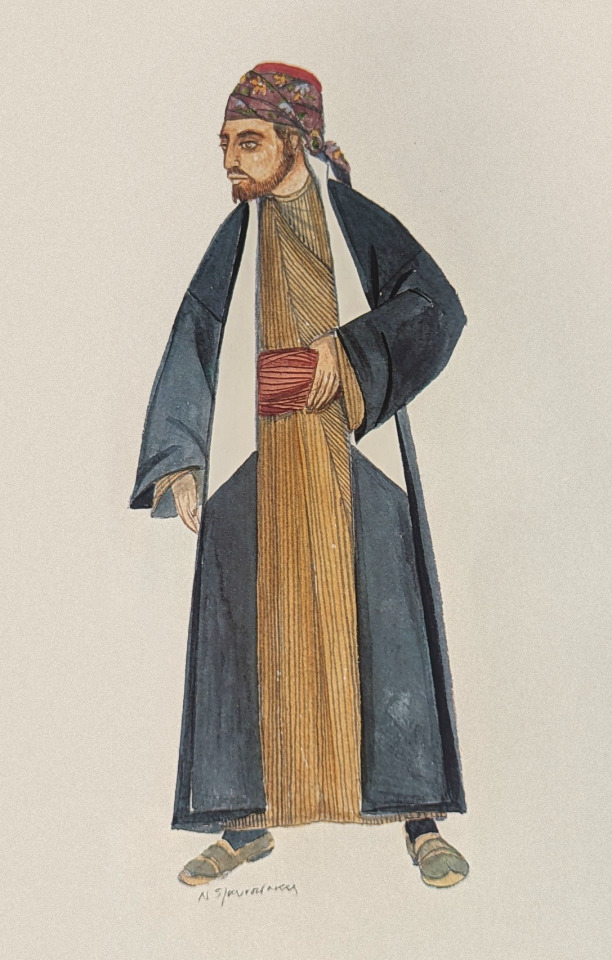
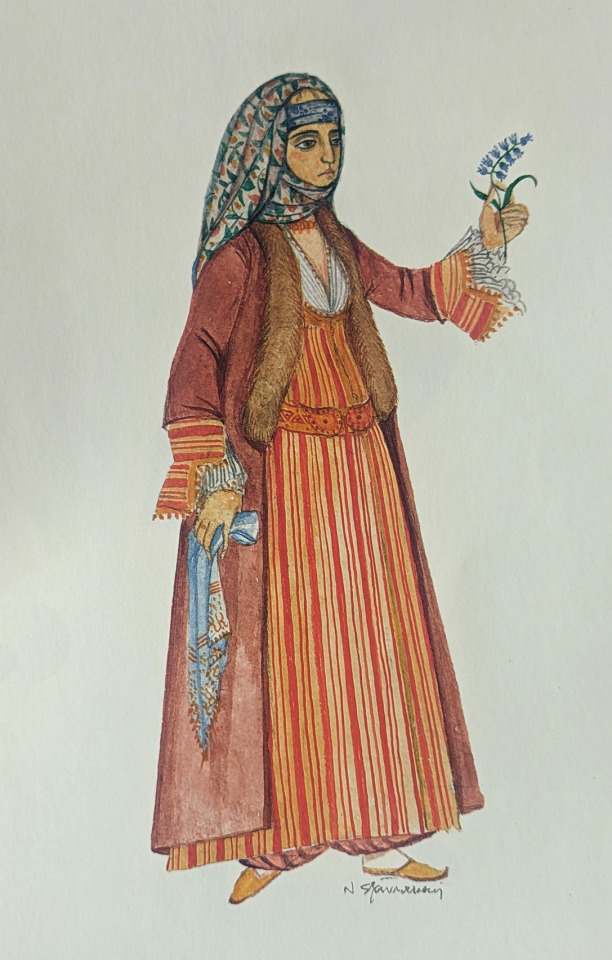
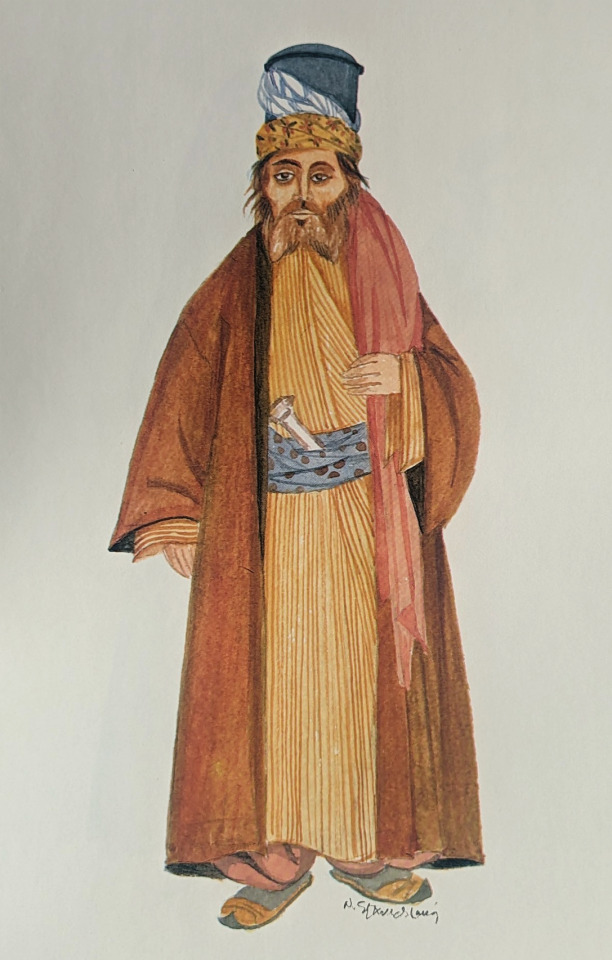

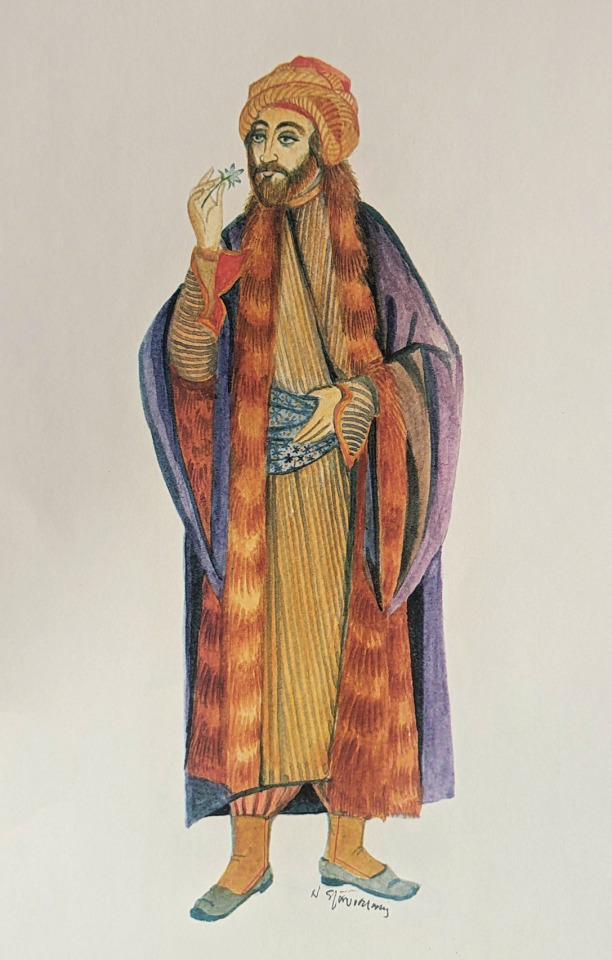
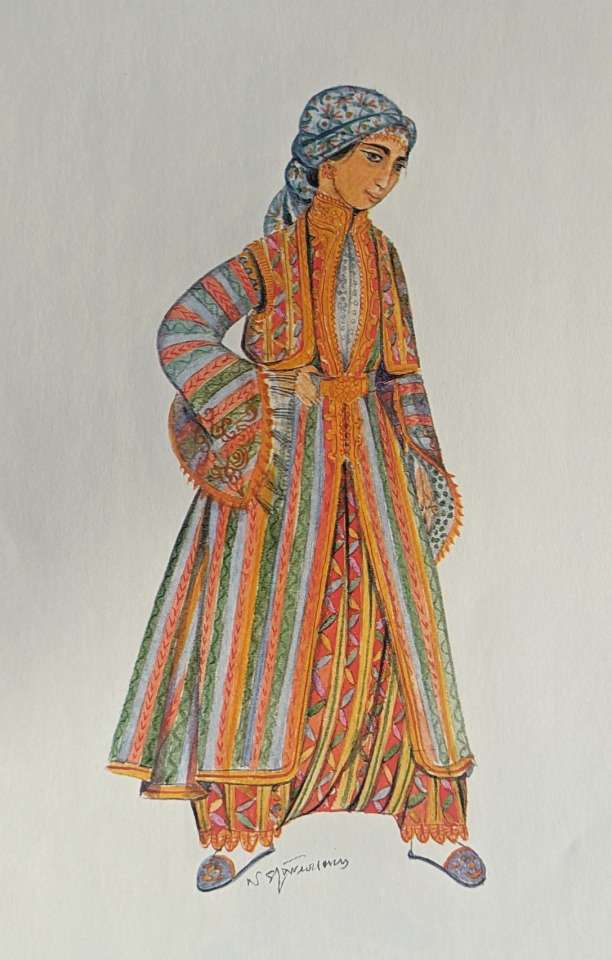
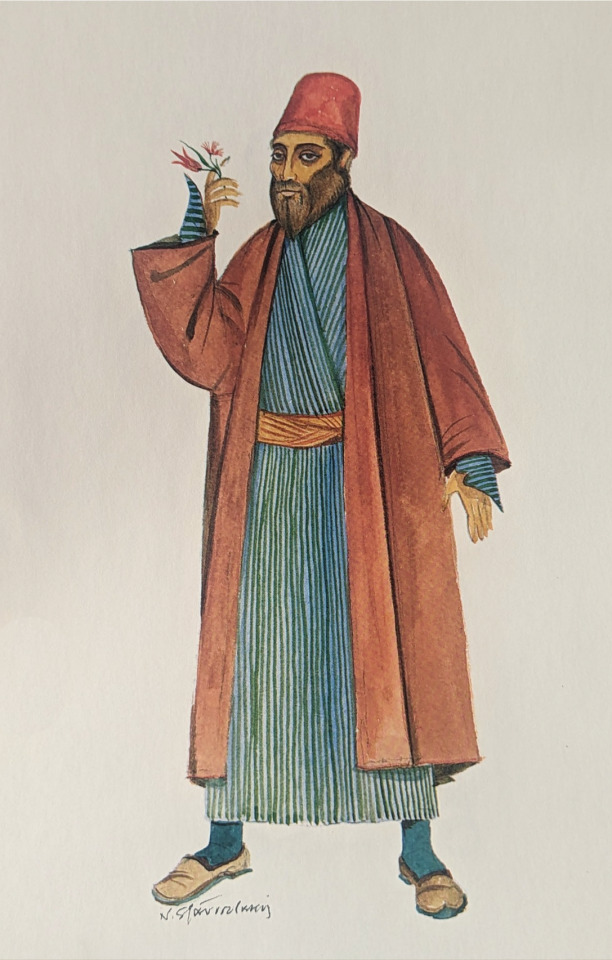

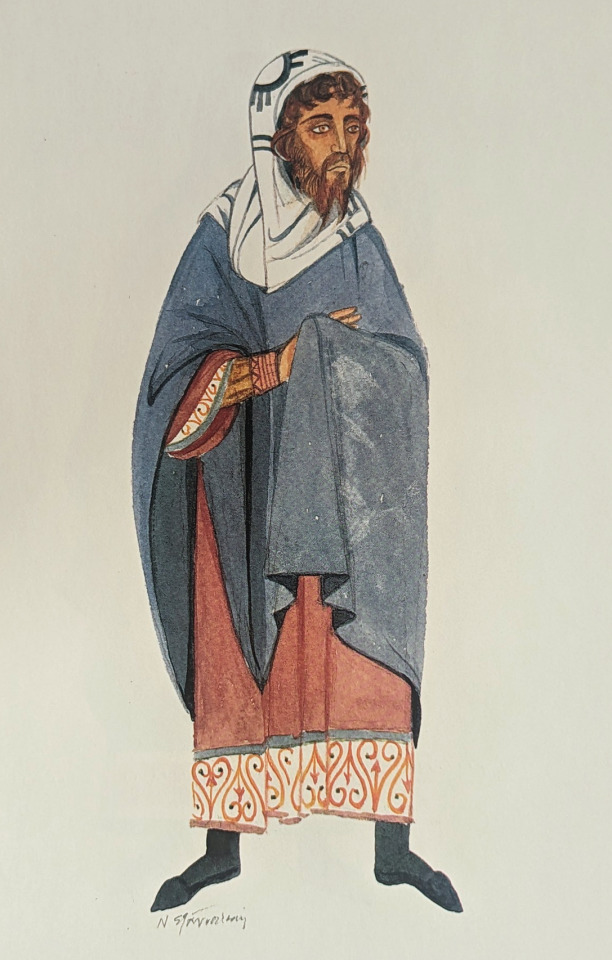
Stavrouakis' work has always meant so much to me, I collect his publishing as I can. I wanted to share some of his depictions of Greek Jews and our clothing, especially the ones I haven't seen shared online.
#jumblr#greek jews#men's clothing is way less often depicted in traditional clothing work and it makes me so happy to own all of these drawings of his.#jewish stuff#he has a great cookbook too.#i just got this publishing of his a couple weeks ago and it makes me so happy. it comes in both greek and english in the same packet.
1K notes
·
View notes
Text



some tristevas i drew while the internet was out… enjoy
#they’re so awesome i will cry#fanfiction about them is coming along swimmingly if anyone . cares .#i’m writing stuff in my downtime at school so i think ill publish a chapter for week#for the love of the game mind you . it could get 2 hits and ill keep posting idgaf#uhmmm sonegung something tristeva is cool id kill and die for them etc u get it#wakfu#digital art#art#tristeva#artists on tumblr#evangelyne#wakfu fanart#tristepin de percedal#wakfu tristepin#continuing with my transtepin agenda#wakfu more like WOKEfu
457 notes
·
View notes
Text
3 Exercises To Improve Your Writing/Manuscript
1) Sentence Patterning 🎨
Print off a random page of your work and use different coloured highlighters on each sentence depending on how long they are. You might notice you’ve been stuck in a rhythm without realising it. A rainbow is what you want to see!
2) Stickynoting! 📝
Write out each scene (or topic change) on a stickynote thats colour indicates how plotheavy it is. A few fluffy, relaxed scenes are fine, but you don’t want half the book to be pointless. Likewise, you also don't want every scene to be insanely over the top.
3) Pindropping 📌
Draw a line, mark out the major events of your story, then drop in every revelation, character introduction, first mention, shift and development. See how dense certain areas might be vs others. Do you throw everything at the reader in the first chapter? Or do you hold back too much and leave your audience clueless.
Here are some examples I did for my book!


Click “My Writing Tips” in the tags for more!
Click here to check out my book! @statusquoofficial
#my writing tips#writing prompt#novel writing#my writing#writers#writing life#aspiring writer#writing stuff#creative writing#writer#writing#ao3 writer#creative writers#fanfic writing#female writers#queer writers#story writing#tumblr writing community#writerscommunity#writer thoughts#writer problems#writing community#writing is hard#writing problems#writers on tumblr#aspiring novelist#aspiring author#aspiring artist#new author#self publishing
676 notes
·
View notes
Text
comics are such a good storytelling medium i wish they were good
#i say this as a superhero comic enjoyer but. it is a tragedy that superhero stories completely dominate the comic industry#i am kissing indie comic publishers on the mouth WITH TONGUE AND HAND STUFF
1K notes
·
View notes
Text
Steps to Writing a ‘Chosen One’ Character

follow for more tips 💋 || request writing tips 💌
1. Establish the Foundation
Define Their Origin: Decide what makes them the Chosen One—prophecy, destiny, lineage, or sheer coincidence. Clarify why they, specifically, are given this role.
Determine Their Initial Attitude: Are they reluctant, eager, indifferent? Show how they react to the burden of being chosen.
Set Their Core Struggles: Define the internal and external conflicts they will face. Do they wrestle with imposter syndrome, moral dilemmas, or fear of failure?
2. Shape Their Role in the Story
Decide Their Purpose: Are they meant to destroy an evil force, restore balance, protect a sacred artifact, or lead a rebellion? Ensure their journey aligns with the story’s central themes.
Avoid Overpowered Tropes: They shouldn’t be flawless. Give them limitations, weaknesses, or struggles that make their growth compelling.
Show Their Impact on Others: How do allies, mentors, or even enemies perceive them? Their role should ripple beyond just their own development.
3. Build Their Character Development
Challenge Their Destiny: Let them question, doubt, or even reject their role at some point. Growth comes from resistance, not blind acceptance.
Forge Meaningful Relationships: Give them friends, mentors, and rivals who help shape their journey. Avoid making them the sole focus of the story’s world.
Balance Personal Desires and Duty: Show moments where their personal wants clash with their responsibilities as the Chosen One.
4. Define Their Abilities and Training
Determine Their Power Source: Magic, divine intervention, inherited skill, or sheer perseverance—whatever it is, make it unique and consistent.
Avoid Instant Mastery: They should struggle, fail, and improve through effort, mentorship, and experience.
Give Them a Signature Strength and Weakness: Maybe they’re brilliant strategists but poor close-combat fighters, or they can harness powerful magic but suffer from physical fragility.
5. Create Meaningful Obstacles
Test Their Morals and Limits: Put them in situations where they must make difficult choices. Let their decisions shape their character.
Introduce Personal Stakes: The battle shouldn’t just be about saving the world—it should also mean something deeply personal to them.
Make Victory Costly: Triumph shouldn’t come without sacrifice—whether it’s losing loved ones, suffering personal injuries, or making difficult trade-offs.
6. Develop a Satisfying Arc
Decide Their Ultimate Fate: Will they survive and thrive? Sacrifice themselves for the greater good? Retire into obscurity? Make sure their journey reaches a meaningful conclusion.
Showcase Their Legacy: Whether they win or lose, let their choices leave a lasting impact on the world around them.
Avoid Predictability: Subvert clichés where possible—maybe the Chosen One isn’t the true hero, or perhaps their destiny isn’t as set in stone as they believed.
Examples of ‘Chosen One’ Characters
Film/TV Examples:
Luke Skywalker (Star Wars): A reluctant hero who grows into his role while battling his own darkness.
Aang (Avatar: The Last Airbender): A lighthearted but deeply burdened Chosen One struggling with war and responsibility.
Buffy Summers (Buffy the Vampire Slayer): A Chosen One who balances personal life with monster-hunting, questioning fate and sacrifice.
2. Literature Examples:
Harry Potter (Harry Potter series): A prophesied hero whose strengths lie in his friendships and moral choices.
Percy Jackson (Percy Jackson & the Olympians): A reluctant demigod whose humor and flaws make him a relatable Chosen One.
Duke the Guarder (The Guardians of Camoria series): A noble-hearted Chosen One defined by mercy, internal conflict, and a fear of death.

Follow || Like || Comment || Repost || My Novel ⇚⇚⇚
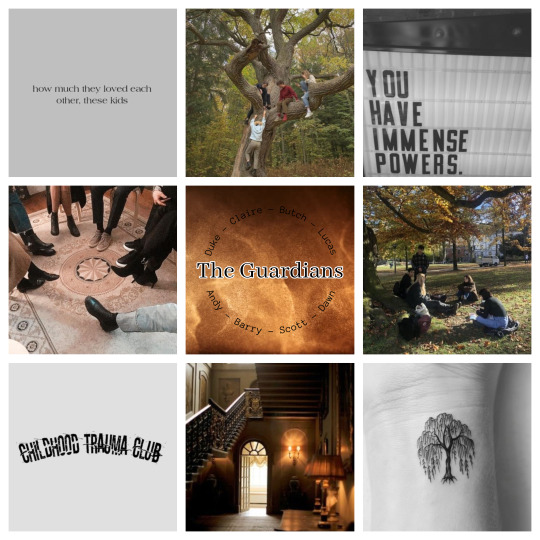

thank you, i am farkle :)
#౨ৎ a.a.walker's tips ౨ৎ#writer#writers on tumblr#creative writing#booklr#academia#artists on tumblr#aspiring author#college#nostalgia#on writing#writerscommunity#writers and poets#female writers#ao3 writer#writing community#writeblr#on writers#writing tips and tricks#writing help#writing advice#writing resources#writing stuff#fiction writing#writing tips#storytelling#narrative#publishing#fiction#write
436 notes
·
View notes
Text
Fashion and Power; Hair and Identity: An Analysis of Olrox in Castlevania Nocturne
So. I've been thinking a lot lately about Olrox's design and how he dresses.
Like we have Drolta who is serving cunt in a totally different, usually wildly anachronistic, outfit every other scene... And we have Alucard still wearing the same tattered, moth-eaten overcoat he was sporting 300 years ago...

And then we have Olrox, whose outfit is very much in keeping with the style we see worn by our model french nobleman, the Marquis:

You can see the similarities between their looks: the stockings and shoes, the cravat, the tall collar, the pleats, the contrasting trims and accents, the highlights that suggest the fabric has a silken/satin sheen.
...But for his first appearance in Boston, he's wearing something similar—but not so flashy. Which makes sense, because a lot of the above details would be too ostentatious for colonial sensibilities and just not as accessible there. His Boston look is very clearly in the same style as Julia's outfit:

The boots with the dramatic cuffs, the wide lapels, the longer coat, the way the trims and accents are much more subtle, and the lack of that satin sheen we see in the French outfits.
I point this stuff out because it tells us that not only does Olrox dress well, but he dresses according to what is in fashion around him. He's not like Drolta, expressing himself by wearing whatever the fuck he wants—nor is he like Alucard, still dressing the way a past version of himself once did, existing sort of outside of time. That Olrox has two subtly different outfits in the span of ten years seems to indicate that this is a man who speaks the language of fashion, who understands the role it plays in society, and how it is used to assert power for oneself in the right contexts.
I've seen the take a few times of like, "Olrox is probably itching to take off those stuffy white people clothes" or whatever and... I can't say that I agree. I get the sense that he enjoys not just wearing fine clothes, but dressing in a way that signals to the people around him: "Do not presume that you are better than me". It serves as a form of armor, a safety blanket, a way to protect himself and assert the power he fears he will be denied otherwise.
I've said this before but like... his dialogue in his scenes with Drolta and Erzsebet is positively laden with these sort of subtle, calculated assertions or denials of power. From the moment he first arrives in Machecoul, he refuses Vaublanc's escort, thus refusing to engage on the terms they are trying to set for his visit: you are not my host, I am not dependent on you, I am here acting on my own interests and not to answer to your beck and call. He speaks carefully, politely, and hides his true feelings behind a façade of respectability. Saying all the things they want to hear, but wearing none of it on his face, in his eyes, in his tone of voice. He's playing a part, playing the game, and playing it well—all the while hiding his true intentions and dodging questions he doesn't want to answer.
That Olrox is such a careful, eloquent speaker can be read as a quintessentially 'Aztec' thing: the Nahuatl language is very full of metaphor, the nobility spoke a different dialect that distinguished them from the rest of society, and the ability to speak beautifully and wisely is something that was regarded very highly. Furthermore, the words we have on record that Motēuczōmah Xocoyotzin said to Cortés and that the Spanish would later use to claim the Mexica thought Cortés was a god, were probably more like... sarcasm. You've heard of malicious compliance; the Mexica were apparently fond of malicious politeness: over the top flattery meant to mock rather than praise. Which is exactly the vibe Olrox gives off in his exchanges with Erzsebet. ("Yes, charmed to meet you", "Flattered, for a god to have heard of me," "As you well know, I both admire and worship you, goddess," etc.)
I think his manner of dress functions as an extension of this.
While Olrox's clothing bears like, zero resemblance whatsoever to how men styled themselves in the Mexica empire (Fantastic references by Daniel Parada on ArtStation), the Mexica did have strict sumptuary laws about which classes of people could wear which types of clothes/colors/fabrics/jewelry/hairstyles. Maybe he was a commoner who had to wear clothes out of rough maguey fiber and never wants to go back to that. Maybe he was nobility and this is a mentality that he has clung to. Either way, fashion as a language of status, power, and control is something Olrox would understand intimately.
Consider Drolta for a moment: in retrospect, the fact that she has so many outfits and wears whatever she wants to the point of outshining Erzsebet in every scene she's in, was a strong indicator that she was the one with the real power, the one pulling the strings all along.

And here creates a stark contrast: Drolta who asserts her power by dressing in a way that expresses herself in her own visual language, vs Olrox, who is asserting his power in the visual language of his oppressors. Even in Drolta's more conservative outfits, there are a lot of details that are undeniably her own spin on the style; she's playing with these conventions rather than conforming to them. She does not have to play the game and follow the rules in the same way that Olrox does.
So now let's address the elephant in the room:
Olrox's hairstyle is... not at all accurate to how men were wearing their hair in pre-colonial mesoamerica, which was either a sort of shoulder-length bowl cut, shorn on the sides, or long but matted and tied back. (More fantastic references by the same artist on ArtStation) But unlike his clothing, it's also not a style that would be considered fashionable to the European upper class.
I've seen plenty of people theorize that it's meant to resemble a style that would have been appropriate for Mahican men at the time—a way to pay homage to the man he loved. But I don't really think this is the case. For most tribes in the northeast, men either traditionally wear two braids, or in times of war, a 'roach' or 'mohawk' hairstyle: with most of the head shaved except for a single lock, which might be adorned with feathers, beads, and so on. At most, Olrox's single braid could maybe be a nod to this, but not the hairstyle as a whole.
Honestly, I struggle to find any tribes whose men traditionally wear their hair loose, and I'm sure half of this design choice was just the animation team trying to give him some likeness to his voice actor. Zahn McClarnon, who is Hunkpapa-Lakota, often wears his long hair loose—though this hairstyle isn't necessarily characteristic to the Lakota either, who also traditionally wear their hair in 2-3 braids (and which to be fair McClarnon also wears often). The other half of this design choice I'm sure lies in the fact that loose hair lends more flexibility for animators to use it expressively in-frame.
Regardless, any piece of media is in conversation with a contemporary audience. Nowadays, it's pretty common for indigenous men from various cultural traditions to sport long, loose hair. And there's a reason for this: regardless of the specific beliefs and practices around hair from one tribe to another, hair has become a strong marker of cultural identity for the larger, pan- indigenous community, as the forced assimilation of indigenous people often manifested as the cutting off of indigenous men's hair in boarding schools. In this context, to grow out one's hair can be a way of reclaiming a part of their identity which has long been forcibly taken from them.
So... the cultural/historical inaccuracy of Olrox's particular hairstyle aside, we can still look at the significance of hair itself in a broader sense: Hair is important to his character.
I look all the shots we get of Olrox's hair, the way it is used in the frame, used so expressively, and it feels like... yeah. His hair is the piece of himself he refuses to let go of. The clothes can change, he can bow down to Bàthory, get branded, etc. But his hair is an inextricable part of him. In this context, his hair becomes his identity, this stand-in for his true self when all the rest of him (clothes, speech, etc) are functioning instead as a sort of social camouflage.
We normally see Olrox's hair neatly swept behind his shoulders, often with a few strands framing the side of his face. But we get a couple of scenes where this isn't the case:

The first time we get a shot of Olrox's hair kinda spread out and disheveled outside of motion scenes is the cut to him and Mizrak lying in bed after having had sex. Paired with the askew angle of his body contrasted against Mizrak's rigid body, Olrox's hair suggests that he is in a vulnerable state, that he has let his guard down if not physically, then emotionally. He has "let his hair down" and already caught some kind of feelings for Mizrak—while Mizrak spends this scene putting up a giant brick wall.
The majority of Olrox's hair here is also to his left—away from Mizrak. While Olrox has given up some measure of power here, he doesn't need Mizrak to know that yet. He turns his head to see what Mizrak is doing, and receives a clear message: Mizrak is not ready to give up any power or control. Not ready to be vulnerable with him. And so Olrox takes this cue to sit up and let his hair return to its usual, neatly gathered position—thus putting back up a kind of wall of his own as he tries to coax some honesty out of Mizrak through more deliberate means.

In the S1 finale, we see Olrox's hair cover his face just as Machecoul falls to Erzsebet and becomes enshrouded in shadows. One Nahuatl expression, "Axcan mixtlapachmana yn tonatíuh" translates to, "Today the sun has covered its face." This is an expression of grief over the death of a leader or elder, the fall of a city, or the loss of a tradition. Despite the stoicism on his face in this moment, Olrox's hair tells us how he really feels. Something has been lost, and despite the fact that he probably expected it—despite the fact that he has been here before—he is still grieving that loss.

During the S2 branding scene, we see Olrox get on one knee and bow to Erzsebet—thus arriving at the inevitable conclusion of the game he's been playing all season. In his effort to survive by playing along, conceding his pride, his ego, his integrity, his self—he still finds himself trapped. As he accepts his fate, his hair fails over his face in a pattern that resembles the bars of a cage or prison cell. (Interestingly, his dialogue before this is "What did he do?", which makes this whole scene echo his "what crime did you commit?" scene with an imprisoned Edouard in the catacombs back in S1)
In S1, we also got a scene where Olrox bows to Erzsebet, but it's very different from this one. He never gets on his knee, and his hair remains neatly draped over his shoulders. He's conceding a little bit of power, but it's a strategic thing he ultimately does with some degree of willingness. In the S2 bow however, it is because he recognizes he is cornered and no longer has any moves left to make.

In S2E6, we see Olrox waiting at the harbor, preparing to leave to return to the New World. In the previous episode, he asks Mizrak to come with him—who refuses on the grounds that they would spend their lives hiding from Erzsebet. I'm sure @mysteryanimator could write an essay about the framing in this scene and how it makes it so that Olrox is boxed in and can't leave—but his hair is flowing freely. He doesn't have to leave. He has always had a choice: the choice to stay and to fight, and to win true freedom—not just a life on the run, or the sort of double life of having to carefully navigate the social world of others and keep his true self hidden in order to survive.

Now, in the S2 finale, Olrox turns a dying Mizrak into a vampire—but they have an interesting conversation leading up to that moment, and for just about the entirety of this conversation, Olrox's hair is obscuring his face. There is something he is hiding from Mizrak in this scene, something keeping them apart and keeping this conversation from being an open and totally honest one. I've written about what I think this scene foretells, and @mysteryanimator has also done a really thorough shot-for-shot analysis about the visual storytelling happening here, which also touches on the role Olrox's hair plays in this scene.

After Olrox turns Mizrak, we see him lying in bed with his shirt open, exposing his chest and bisecting his heart. The Nahuatl "Omeyolloa" translates to "two hearts", or "the heart is split in two", and refers to an internal conflict. But Olrox's hair is splayed out around him, adding to the sense of vulnerability and being laid bare. While Olrox's hands are folded in his lap with apprehension or restraint, his hair seems to reach in Mizrak's direction in their stead. The hair gives voice to the half of his heart that cares about Mizrak and wants to reach out to him, while the rest is immobilized by the guilt or remorse over what he had to do to keep him.
I've also written a bit of analysis about how this shot mirrors the shot of Julia bleeding out in S1E1: how Olrox's hair is pooled around him the same way her blood was, and how these compositions suggest a sacrificial offering. In this scene, Olrox is offering his hair—his self—up to Mizrak in a gesture of love and penance.
Anyway I could probably go on but I have reached the 10 image limit and this is long enough already. I guess if there's a point to be made with all of this, it's that I don't think the cultural/historical inaccuracy of Olrox's design detracts from his character, but actually does a lot to tell a story about how he has been affected by the forces of colonization, and in what ways his identity as a Mexica man influences the way he now navigates the world around him.
But mostly??? I just love Olrox Castlevania Nocturne and like thinking about him a totally normal amount 🫠🫠🫠
#olrox#castlevania#castlevania nocturne#am i reaching with some of this stuff??? maybe#but i don't care#i am the Audience and I am bringing what I See into the Conversation#also if u saw me post this earlier and immediately delete it bc i accidentally published it unfinished... no u didn't 🫣
343 notes
·
View notes
Text
I was already on a hair trigger today trying not to snap at a mutual for reblogging a "fuck authors who use Amazon" post, but, like, this shit is why some authors can only afford to use Amazon.
They don't have the $75+ to distribute through Ingram Spark. They don't have the $25 it takes to change your files if you need to update them after they've been accepted. They can't afford to take the cost of printing hit to their sales. They can't afford to lose an additional 40% of their income to retailer discounts.
And just so we're clear, Ingram isn't a vanity publisher. They're one of the largest print monopolies in the world. They're used by most mainstream traditional publishers and indie and self-pub authors alike. Amazon uses them when their print demand is too high.
My friend, whose work is published by Gollancz, is printed through Ingram, the same as mine. The difference is their publisher takes the hit for them. In theory. We won't get into dwindling advances here or how publishers are increasingly putting the onus of marketing and sales onto their authors or the fact that their editors can't afford rent or food while the executives get richer and richer.
So what do you do when the mainstream doesn't want you? What do you do when you're told if you can't keep up with the rat race, that you don't deserve to have your work published? What do you do if all you have is the ability to tell stories for a living, and no one wants you?
Well, you could die of starvation. I'm sure there are several people on here who'd be happy if that happened to me. (I know. Because they tell me. Often.) Or, you can shake hands with the devil, knowing it's a bum deal, knowing everything is fucked, but also knowing that every other aspect of this fucking industry is just as fucking bad.
There's no escape. It's relentless.
And you've got people out there posting things like, "Actually, I think authors who charge for their books are part of the problem."
And yeah, in an ideal world, I'd be making art for art's sake.
But we're not in that world. We're in the bad place, and you're actively making it worse. You're encouraging people to steal from people who are struggling just like you and calling it activism against billionaires or putting them in the same moral category as said billionaires as though we're not trapped in this system, same as you. Some of you are fellow fucking authors. And, like, my mind boggles at what it would take to stab a fellow creative in the back like that, but here we are.
Hell world.
#long post#vent post#publishing#author stuff I get#anyone clowning on this post gets put in the wood chipper
4K notes
·
View notes